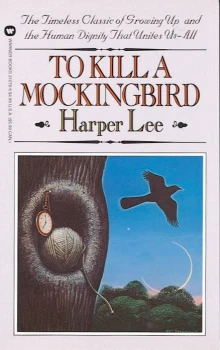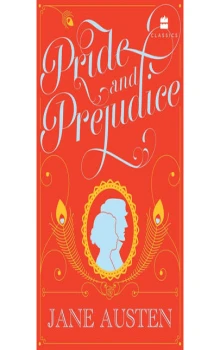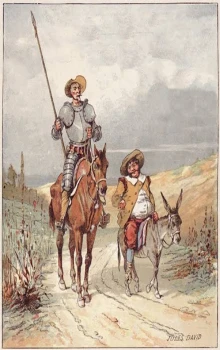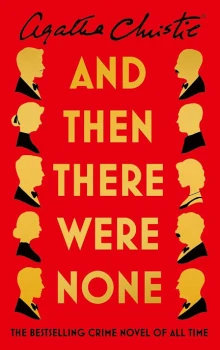-five
THE NEXT MORNING Scarlett’s body was so stiff and sore from the long miles
of walking and jolting in the wagon that every movement was agony. Her
face was crimson with sunburn and her blistered palms raw. Her tongue was
furred and her throat parched as if flames had scorched it and no amount of
water could assuage her thirst. Her head felt swollen and she winced even
when she turned her eyes. A queasiness of the stomach reminiscent of the
early days of her pregnancy made the smoking yams on the breakfast table
unendurable, even to the smell. Gerald could have told her she was
suffering the normal aftermath of her first experience with hard drinking
but Gerald noticed nothing. He sat at the head of the table, a gray old man
with absent, faded eyes fastened on the door and head cocked slightly to
hear the rustle of Ellen’s petticoats, to smell the lemon verbena sachet.
As Scarlett sat down, he mumbled: “We will wait for Mrs. O’Hara. She
is late.” She raised an aching head, looked at him with startled incredulity
and met the pleading eyes of Mammy, who stood behind Gerald’s chair.
She rose unsteadily, her hand at her throat and looked down at her father
in the morning sunlight. He peered up at her vaguely and she saw that his
hands were shaking, that his head trembled a little.
Until this moment she had not realized how much she had counted on
Gerald to take command, to tell her what she must do, and now—Why,
last night he had seemed almost himself. There had been none of his usual
bluster and vitality, but at least he had told a connected story and now—
now, he did not even remember Ellen was dead. The combined shock of
the coming of the Yankees and her death had stunned him. She started to
speak, but Mammy shook her head vehemently and raising her apron
dabbed at her red eyes.
“Oh, can Pa have lost his mind?” thought Scarlett and her throbbing
head felt as if it would crack with this added strain. “No, no. He’s just dazed
by it all. It’s like he was sick. He’ll get over it. He must get over it. What
will I do if he doesn’t?—I won’t think about it now. I won’t think of him or
Mother or any of these awful things now. No, not till I can stand it. There
are too many other things to think about—things that can be helped
without my thinking of those I can’t help.”
She left the dining room without eating, and went out onto the back
porch where she found Pork, barefooted and in the ragged remains of his
best livery, sitting on the steps cracking peanuts. Her head was hammering
and throbbing and the bright sunlight stabbed into her eyes. Merely
holding herself erect required an effort of will power and she talked as
briefly as possible, dispensing with the usual forms of courtesy her mother
had always taught her to use with negroes.
She began asking questions so brusquely and giving orders so decisively
Pork’s eyebrows went up in mystification. Miss Ellen didn’t never talk so
short to nobody, not even when she caught them stealing pullets and
watermelons. She asked again about the fields, the gardens, the stock, and
her green eyes had a hard glaze which Pork had never seen in them before.
“Yas’m, dat hawse daid, layin’ dar whar Ah tie him wid his nose in de
water bucket he tuhned over. No’m, de cow ain’ daid. Din’ you know? She
done have a calf las’ night. Dat why she beller so.”
“A fine midwife your Prissy will make,” Scarlett remarked caustically.
“She said she was bellowing because she needed milking.”
“Well’m, Prissy ain’ fixing to be no cow midwife, Miss Scarlett,” Pork
said tactfully. “An’ ain’ no use quarrelin’ wid blessin’s, cause dat calf gwine
ter mean a full cow an’ plen’y buttermilk fer de young Misses, lak dat
Yankee doctah say dey’d need.”
“All right, go on. Any stock left?”
“No’m. Nuthin’ ’cept one ole sow an’ her litter. Ah driv dem inter de
swamp de day de Yankees come, but de Lawd knows how we gwine get
dem. She mean, dat sow.”
“We’ll get them all right. You and Prissy can start right now hunting for
her.”
Pork was amazed and indignant.
“Miss Scarlett, dat a fe’el han’s bizness. Ah’s allus been a house nigger.”
A small fiend with a pair of hot tweezers plucked behind Scarlett’s
eyeballs.
“You two will catch the sow—or get out of here, like the field hands
did.”
Tears trembled in Pork’s hurt eyes. Oh, if only Miss Ellen were here! She
understood such niceties and realized the wide gap between the duties of a
field hand and those of a house nigger.
“Git out, Miss Scarlett? Whar’d Ah git out to, Miss Scarlett?”
“I don’t know and I don’t care. But anyone at Tara who won’t work can
go hunt up the Yankees. You can tell the others that too.”
“Yas’m.”
“Now, what about the corn and the cotton, Pork?”
“De cawn? Lawd, Miss Scarlett, dey pasture dey hawses in de cawn an’
cah’ied off whut de hawses din’ eat or spile. An’ dey driv dey cannons an’
wagons ’cross de cotton till it plum ruint, ’cept a few acres over on de creek
bottom dat dey din’ notice. But dat cotton ain’ wuth foolin’ wid, ’cause ain’
but ’bout three bales over dar.”
Three bales. Scarlett thought of the scores of bales Tara usually yielded
and her head hurt worse. Three bales. That was little more than the
shiftless Slatterys raised. To make matters worse, there was the question of
taxes. The Confederate government took cotton for taxes in lieu of money,
but three bales wouldn’t even cover the taxes. Little did it matter though,
to her or the Confederacy, now that all the field hands had run away and
there was no one to pick the cotton.
“Well, I won’t think of that either,” she told herself. “Taxes aren’t a
woman’s job anyway. Pa ought to look after such things, but Pa—I won’t
think of Pa now. The Confederacy can whistle for its taxes. What we need
now is something to eat.”
“Pork, have any of you been to Twelve Oaks or the MacIntosh place to
see if there’s anything left in the gardens there?”
“No, Ma’m! Us ain’ lef’ Tara. De Yankees mout git us.”
“I’ll send Dilcey over to MacIntosh. Perhaps she’ll find something there.
And I’ll go to Twelve Oaks.”
“Who wid, chile?”
“By myself. Mammy must stay with the girls and Mr. Gerald can’t—”
Pork set up an outcry which she found infuriating. There might be
Yankees or mean niggers at Twelve Oaks. She mustn’t go alone.
“That will be enough, Pork. Tell Dilcey to start immediately. And you
and Prissy go bring in the sow and her litter,” she said briefly, turning on
her heel.
Mammy’s old sunbonnet, faded but clean, hung on its peg on the back
porch and Scarlett put it on her head, remembering, as from another world,
the bonnet with curling green plume which Rhett had brought her from
Paris. She picked up a large split-oak basket and started down the back
stairs, each step jouncing her head until her spine seemed to be trying to
crash through the top of her skull.
The road down to the river lay red and scorching between the ruined
cotton fields. There were no trees to cast a shade and the sun beat down
through Mammy’s sunbonnet as if it were made of tarlatan instead of heavy
quilted calico, while the dust floating upward sifted into her nose and
throat until she felt the membranes would crack if she spoke. Deep ruts and
furrows were cut into the road where horses had dragged heavy guns along
it and the red gullies on either side were deeply gashed by the wheels. The
cotton was mangled and trampled where cavalry and infantry, forced off the
narrow road by the artillery, had marched through the green bushes,
grinding them into the earth. Here and there in road and fields lay buckles
and bits of harness leather, canteens flattened by hooves and caisson
wheels, buttons, blue caps, worn socks, bits of bloody rags, all the litter left
by a marching army.
She passed the clump of cedars and the low brick wall which marked the
family burying ground, trying not to think of the new grave lying by the
three short mounds of her little brothers. Oh, Ellen—She trudged on down
the dusty hill, passing the heap of ashes and the stumpy chimney where the
Slattery house had stood, and she wished savagely that the whole tribe of
them had been part of the ashes. If it hadn’t been for that nasty Emmie,
who’d had a bastard brat by their overseer—Ellen wouldn’t have died.
She moaned as a sharp pebble cut into her blistered foot. What was she
doing here? Why was Scarlett O’Hara, the belle of the County, the
sheltered pride of Tara, tramping down this rough road almost barefoot?
Her little feet were made to dance, not to limp, her tiny slippers to peep
daringly from under bright silks, not to collect sharp pebbles and dust. She
was born to be pampered and waited upon, and here she was, sick and
ragged, driven by hunger to hunt for food in the gardens of her neighbors.
At the bottom of the long hill was the river and how cool and still were
the tangled trees overhanging the water! She sank down on the low bank,
and stripping off the remnants of her slippers and stockings, dabbled her
burning feet in the cool water. It would be so good to sit here all day, away
from the helpless eyes of Tara, here where only the rustle of leaves and the
gurgle of slow water broke the stillness. But reluctantly she replaced her
shoes and stockings and trudged down the bank, spongy with moss, under
the shady trees. The Yankees had burned the bridge but she knew of a
footlog bridge across a narrow point of the stream a hundred yards below.
She crossed it cautiously and trudged uphill the hot half-mile to Twelve
Oaks.
There towered the twelve oaks, as they had stood since Indian days, but
with their leaves brown from fire and the branches burned and scorched.
Within their circle lay the ruins of John Wilkes’ house, the charred remains
of that once stately home which had crowned the hill in white-columned
dignity. The deep pit which had been the cellar, the blackened field-stone
foundations and two mighty chimneys marked the site. One long column,
half-burned, had fallen across the lawn, crushing the cape jessamine
bushes.
Scarlett sat down on the column, too sick at the sight to go on. This
desolation went to her heart as nothing she had ever experienced. Here
was the Wilkes pride in the dust at her feet. Here was the end of the kindly,
courteous house which had always welcomed her, the house where in futile
dreams she had aspired to be mistress. Here she had danced and dined and
flirted and here she had watched with a jealous, hurting heart how Melanie
smiled up at Ashley. Here, too, in the cool shadows of the trees, Charles
Hamilton had rapturously pressed her hand when she said she would marry
him.
“Oh, Ashley,” she thought, “I hope you are dead! I could never bear for
you to see this.”
Ashley had married his bride here but his son and his son’s son would
never bring brides to this house. There would be no more matings and
births beneath the roof which she had so loved and longed to rule. The
house was dead and, to Scarlett, it was as if all the Wilkeses, too, were dead
in its ashes.
“I won’t think of it now. I can’t stand it now. I’ll think of it later,” she
said aloud, turning her eyes away.
Seeking the garden, she limped around the ruins, by the trampled rose
beds the Wilkes girls had tended so zealously, across the back yard and
through the ashes of the smokehouse, barns and chicken houses. The split-
rail fence around the kitchen garden had been demolished and the once
orderly rows of green plants had suffered the same treatment as those at
Tara. The soft earth was scarred with hoof prints and heavy wheels and the
vegetables were mashed into the soil. There was nothing for her here.
She walked back across the yard and took the path down toward the
silent row of whitewashed cabins in the quarters, calling “Hello!” as she
went. But no voice answered her. Not even a dog barked. Evidently the
Wilkes negroes had taken flight or followed the Yankees. She knew every
slave had his own garden patch and as she reached the quarters, she hoped
these little patches had been spared.
Her search was rewarded but she was too tired even to feel pleasure at
the sight of turnips and cabbages, wilted for want of water but still
standing, and straggling butter beans and snap beans, yellowing but edible.
She sat down in the furrows and dug into the earth with hands that shook,
filling her basket slowly. There would be a good meal at Tara tonight, in
spite of the lack of side meat to boil with the vegetables. Perhaps some of
the bacon grease Dilcey was using for illumination could be used for
seasoning. She must remember to tell Dilcey to use pine knots and save the
grease for cooking.
Close to the back step of one cabin, she found a short row of radishes
and hunger assaulted her suddenly. A spicy, sharp-tasting radish was exactly
what her stomach craved. Hardly waiting to rub the dirt off on her skirt,
she bit off half and swallowed it hastily. It was old and coarse and so
peppery that tears started in her eyes. No sooner had the lump gone down
than her empty stomach revolted and she lay in the soft dirt and vomited
tiredly.
The faint niggery smell which crept from the cabin increased her nausea
and, without strength to combat it, she kept on retching miserably while
the cabins and trees revolved swiftly around her.
After a long time, she lay weakly on her face, the earth as soft and
comfortable as a feather pillow, and her mind wandered feebly here and
there. She, Scarlett O’Hara, was lying behind a negro cabin, in the midst of
ruins, too sick and too weak to move, and no one in the world knew or
cared. No one would care if they did know, for everyone had too many
troubles of their own to worry about her. And all this was happening to her,
Scarlett O’Hara, who had never raised her hand even to pick up her
discarded stockings from the floor or to tie the laces of her slippers—
Scarlett, whose little headaches and tempers had been coddled and catered
to all her life.
As she lay prostrate, too weak to fight off memories and worries, they
rushed at her, circled about her like buzzards waiting for a death. No longer
had she the strength to say: “I’ll think of Mother and Pa and Ashley and all
this ruin later—Yes, later when I can stand it.” She could not stand it now,
but she was thinking of them whether she willed it or not. The thoughts
circled and swooped above her, dived down and drove tearing claws and
sharp beaks into her mind. For a timeless time, she lay still, her face in the
dirt, the sun beating hotly upon her, remembering things and people who
were dead, remembering a way of living that was gone forever—and
looking upon the harsh vista of the dark future.
When she arose at last and saw again the black ruins of Twelve Oaks,
her head was raised high and something that was youth and beauty and
potential tenderness had gone out of her face forever. What was past was
past. Those who were dead were dead. The lazy luxury of the old days was
gone, never to return. And, as Scarlett settled the heavy basket across her
arm, she had settled her own mind and her own life.
There was no going back and she was going forward.
Throughout the South for fifty years there would be bitter-eyed women
who looked backward, to dead times, to dead men, evoking memories that
hurt and were futile, bearing poverty with bitter pride because they had
those memories. But Scarlett was never to look back.
She gazed at the blackened stones and, for the last time, she saw Twelve
Oaks rise before her eyes as it had once stood, rich and proud, symbol of a
race and a way of living. Then she started down the road toward Tara, the
heavy basket cutting into her flesh.
Hunger gnawed at her empty stomach again and she said aloud: “As
God is my witness, as God is my witness, the Yankees aren’t going to lick
me. I’m going to live through this, and when it’s over, I’m never going to be
hungry again. No, nor any of my folks. If I have to steal or kill—as God is
my witness, I’m never going to be hungry again.”
* * *
In the days that followed, Tara might have been Crusoe’s desert island, so
still it was, so isolated from the rest of the world. The world lay only a few
miles away, but a thousand miles of tumbling waves might have stretched
between Tara and Jonesboro and Fayetteville and Love-joy, even between
Tara and the neighbors’ plantations. With the old horse dead, their one
mode of conveyance was gone, and there was neither time nor strength for
walking the weary red miles.
Sometimes, in the days of back-breaking work, in the desperate struggle
for food and the never-ceasing care of the three sick girls, Scarlett found
herself straining her ears for familiar sounds—the shrill laughter of the
pickaninnies in the quarters, the creaking of wagons home from the fields,
the thunder of Gerald’s stallion tearing across the pasture, the crunching of
carriage wheels on the drive and the gay voices of neighbors dropping in for
an afternoon of gossip. But she listened in vain. The road lay still and
deserted and never a cloud of red dust proclaimed the approach of visitors.
Tara was an island in a sea of rolling green hills and red fields.
Somewhere was the world and families who ate and slept safely under
their own roofs. Somewhere girls in thrice-turned dresses were flirting gaily
and singing “When This Cruel War Is Over,” as she had done only a few
weeks before. Somewhere there was a war and cannon booming and
burning towns and men who rotted in hospitals amid sickening-sweet
stinks. Somewhere a barefoot army in dirty homespun was marching,
fighting, sleeping, hungry and weary with the weariness that comes when
hope is gone. And somewhere the hills of Georgia were blue with Yankees,
well-fed Yankees on sleek corn-stuffed horses.
Beyond Tara was the war and the world. But on the plantation the war
and the world did not exist except as memories which must be fought back
when they rushed to mind in moments of exhaustion. The world outside
receded before the demands of empty and half-empty stomachs and life
resolved itself into two related thoughts, food and how to get it.
Food! Food! Why did the stomach have a longer memory than the
mind? Scarlett could banish heartbreak but not hunger and each morning
as she lay half asleep, before memory brought back to her mind war and
hunger, she curled drowsily expecting the sweet smells of bacon frying and
rolls baking. And each morning she sniffed so hard to really smell the food
she woke herself up.
There were apples, yams, peanuts and milk on the table at Tara but
never enough of even this primitive fare. At the sight of them, three times
a day, her memory would rush back to the old days, the meals of the old
days, the candle-lit table and the food perfuming the air.
How careless they had been of food then, what prodigal waste! Rolls,
corn muffins, biscuit and waffles, dripping butter, all at one meal. Ham at
one end of the table and fried chicken at the other, collards swimming
richly in pot liquor iridescent with grease, snap beans in mountains on
brightly flowered porcelain, fried squash, stewed okra, carrots in cream
sauce thick enough to cut. And three desserts, so everyone might have his
choice, chocolate layer cake, vanilla blanc mange and pound cake topped
with sweet whipped cream. The memory of those savory meals had the
power to bring tears to her eyes as death and war had failed to do, had the
power to turn her ever-gnawing stomach from rumbling emptiness to
nausea. For the appetite Mammy had always deplored, the healthy appetite
of a nineteen-year-old girl, now was increased fourfold by the hard and
unremitting labor she had never known before.
Hers was not the only troublesome appetite at Tara, for wherever she
turned hungry faces, black and white, met her eyes. Soon Carreen and
Suellen would have the insatiable hunger of typhoid convalescents.
Already little Wade whined monotonously: “Wade doan like yams. Wade
hungwy.”
The others grumbled, too:
“Miss Scarlett, ’ness I gits mo’ to eat, I kain nuss neither of these
chillun.”
“Miss Scarlett, ef Ah doan have mo’ in mah stummick, Ah kain split no
wood!”
“Lamb, Ah’s perishin’ fer real vittles.”
“Daughter, must we always have yams?”
Only Melanie did not complain, Melanie, whose face grew thinner and
whiter and twitched with pain even in her sleep.
“I’m not hungry, Scarlett. Give my share of the milk to Dilcey. She
needs it to nurse the babies. Sick people are never hungry.”
It was her gentle hardihood which irritated Scarlett more than the
nagging whining voices of the others. She could—and did—shout them
down with bitter sarcasm but before Melanie’s unselfishness she was
helpless, helpless and resentful. Gerald, the negroes and Wade clung to
Melanie now, because even in her weakness she was kind and sympathetic,
and these days Scarlett was neither.
Wade especially haunted Melanie’s room. There was something wrong
with Wade, but just what it was Scarlett had no time to discover. She took
Mammy’s word that the little boy had worms and dosed him with the
mixture of dried herbs and bark which Ellen always used to worm the
pickaninnies. But the vermifuge only made the child look paler. These days
Scarlett hardly thought of Wade as a person. He was only another worry,
another mouth to feed. Some day when the present emergency was over,
she would play with him, tell him stories and teach him his A B C’s but
now she did not have the time or the inclination. And, because he always
seemed underfoot when she was most weary and worried, she often spoke
sharply to him.
It annoyed her that her quick reprimands brought such acute fright to
his round eyes, for he looked so simple minded when he was frightened.
She did not realize that the little boy lived shoulder to shoulder with terror
too great for an adult to comprehend. Fear lived with Wade, fear that
shook his soul and made him wake screaming in the night. Any
unexpected noise or sharp word set him to trembling, for in his mind noises
and harsh words were inextricably mixed with Yankees and he was more
afraid of Yankees than of Prissy’s hants.
Until the thunders of the siege began, he had never known anything but
a happy, placid, quiet life. Even though his mother paid him little
attention, he had known nothing but petting and kind words until the
night when he was jerked from slumber to find the sky aflame and the air
deafening with explosions. In that night and the day which followed, he
had been slapped by his mother for the first time and had heard her voice
raised at him in harsh words. Life in the pleasant brick house on Peachtree
Street, the only life he knew, had vanished that night and he would never
recover from its loss. In the flight from Atlanta, he had understood nothing
except that the Yankees were after him and now he still lived in fear that
the Yankees would catch him and cut him to pieces. Whenever Scarlett
raised her voice in reproof, he went weak with fright as his vague childish
memory brought up the horrors of that first time she had ever done it. Now,
Yankees and a cross voice were linked forever in his mind and he was afraid
of his mother.
Scarlett could not help noticing that the child was beginning to avoid
her and, in the rare moments when her unending duties gave her time to
think about it, it bothered her a great deal. It was even worse than having
him at her skirts all the time and she was offended that his refuge was
Melanie’s bed where he played quietly at games Melanie suggested or
listened to stories she told. Wade adored “Auntee” who had a gentle voice,
who always smiled and who never said: “Hush, Wade! You give me a
headache” or “Stop fidgeting, Wade, for Heaven’s sake!”
Scarlett had neither the time nor the impulse to pet him but it made her
jealous to see Melanie do it. When she found him one day standing on his
head in Melanie’s bed and saw him collapse on her, she slapped him.
“Don’t you know better than to jiggle Auntee like that when she’s sick?
Now, trot right out in the yard and play, and don’t come in here again.”
But Melanie reached out a weak arm and drew the wailing child to her.
“There, there, Wade. You didn’t mean to jiggle me, did you? He doesn’t
bother me, Scarlett. Do let him stay with me. Let me take care of him. It’s
the only thing I can do till I get well, and you’ve got your hands full
enough without having to watch him.”
“Don’t be a goose, Melly,” said Scarlett shortly. “You aren’t getting well
like you should and having Wade fall on your stomach won’t help you.
Now, Wade, if I ever catch you on Auntee’s bed again, I’ll wear you out.
And stop sniffling. You are always sniffling. Try to be a little man.”
Wade flew sobbing to hide himself under the house. Melanie bit her lip
and tears came to her eyes, and Mammy standing in the hall, a witness to
the scene, scowled and breathed hard. But no one talked back to Scarlett
these days. They were all afraid of her sharp tongue, all afraid of the new
person who walked in her body.
Scarlett reigned supreme at Tara now and, like others suddenly elevated
to authority, all the bullying instincts in her nature rose to the surface. It
was not that she was basically unkind. It was because she was so frightened
and unsure of herself she was harsh lest others learn her inadequacies and
refuse her authority. Besides, there was some pleasure in shouting at people
and knowing they were afraid. Scarlett found that it relieved her
overwrought nerves. She was not blind to the fact that her personality was
changing. Sometimes when her curt orders made Pork stick out his under
lip and Mammy mutter: “Some folks rides mighty high dese days,” she
wondered where her good manners had gone. All the courtesy, all the
gentleness Ellen had striven to instill in her had fallen away from her as
quickly as leaves fall from trees in the first chill wind of autumn.
Time and again, Ellen had said: “Be firm but be gentle with inferiors,
especially darkies.” But if she was gentle the darkies would sit in the
kitchen all day, talking endlessly about the good old days when a house
nigger wasn’t supposed to do a field hand’s work.
“Love and cherish your sisters. Be kind to the afflicted,” said Ellen.
“Show tenderness to those in sorrow and in trouble.”
She couldn’t love her sisters now. They were simply a dead weight on
her shoulders. And as for cherishing them, wasn’t she bathing them,
combing their hair and feeding them, even at the expense of walking miles
every day to find vegetables? Wasn’t she learning to milk the cow, even
though her heart was always in her throat when that fearsome animal
shook its horns at her? And as for being kind, that was a waste of time. If
she was overly kind to them, they’d probably prolong their stay in bed, and
she wanted them on their feet again as soon as possible, so there would be
four more hands to help her.
They were convalescing slowly and lay scrawny and weak in their bed.
While they had been unconscious, the world had changed. The Yankees
had come, the darkies had gone and Mother had died. Here were three
unbelievable happenings and their minds could not take them in.
Sometimes they believed they must still be delirious and these things had
not happened at all. Certainly Scarlett was so changed she couldn’t be real.
When she hung over the foot of their bed and outlined the work she
expected them to do when they recovered, they looked at her as if she were
a hobgoblin. It was beyond their comprehension that they no longer had a
hundred slaves to do the work. It was beyond their comprehension that an
O’Hara lady should do manual labor.
“But, Sister,” said Carreen, her sweet childish face blank with
consternation. “I couldn’t split kindling! It would ruin my hands!”
“Look at mine,” answered Scarlett with a frightening smile as she
pushed blistered and calloused palms toward her.
“I think you are hateful to talk to Baby and me like this!” cried Suellen.
“I think you are lying and trying to frighten us. If Mother were only here,
she wouldn’t let you talk to us like this! Split kindling, indeed!”
Suellen looked with weak loathing at her older sister, feeling sure
Scarlett said these things just to be mean. Suellen had nearly died and she
had lost her mother and she was lonely and scared and she wanted to be
petted and made much of. Instead, Scarlett looked over the foot of the bed
each day, appraising their improvement with a hateful new gleam in her
slanting green eyes and talked about making beds, preparing food, carrying
water buckets and splitting kindling. And she looked as if she took a
pleasure in saying such awful things.
Scarlett did take pleasure in it. She bullied the negroes and harrowed
the feelings of her sisters not only because she was too worried and strained
and tired to do otherwise but because it helped her to forget her own
bitterness that everything her mother had told her about life was wrong.
Nothing her mother had taught her was of any value whatsoever now
and Scarlett’s heart was sore and puzzled. It did not occur to her that Ellen
could not have foreseen the collapse of the civilization in which she raised
her daughters, could not have anticipated the disappearing of the places in
society for which she trained them so well. It did not occur to her that
Ellen had looked down a vista of placid future years, all like the uneventful
years of her own life, when she had taught her to be gentle and gracious,
honorable and kind, modest and truthful. Life treated women well when
they had learned those lessons, said Ellen.
Scarlett thought in despair: “Nothing, no, nothing, she taught me is of
any help to me! What good will kindness do me now? What value is
gentleness? Better that I’d learned to plow or chop cotton like a darky. Oh,
Mother, you were wrong!”
She did not stop to think that Ellen’s ordered world was gone and a
brutal world had taken its place, a world wherein every standard, every
value had changed. She only saw, or thought she saw, that her mother had
been wrong, and she changed swiftly to meet this new world for which she
was not prepared.
Only her feeling for Tara had not changed. She never came wearily
home across the fields and saw the sprawling white house that her heart did
not swell with love and the joy of homecoming. She never looked out of
her window at green pastures and red fields and tall tangled swamp forest
that a sense of beauty did not fill her. Her love for this land with its softly
rolling hills of bright-red soil, this beautiful red earth that was blood
colored, garnet, brick dust, vermilion, which so miraculously grew green
bushes starred with white puffs, was one part of Scarlett which did not
change when all else was changing. Nowhere else in the world was there
land like this.
When she looked at Tara she could understand, in part, why wars were
fought. Rhett was wrong when he said men fought wars for money. No,
they fought for swelling acres, softly furrowed by the plow, for pastures
green with stubby cropped grass, for lazy yellow rivers and white houses
that were cool amid magnolias. These were the only things worth fighting
for, the red earth which was theirs and would be their sons’, the red earth
which would bear cotton for their sons and their sons’ sons.
The trampled acres of Tara were all that was left to her, now that
Mother and Ashley were gone, now that Gerald was senile from shock and
money and darkies and security and position had vanished overnight. As
from another world, she remembered a conversation with her father about
the land and wondered how she could have been so young, so ignorant, as
not to understand what he meant when he said that the land was the one
thing in the world worth fighting for.
“For ’tis the only thing in the world that lasts… and to anyone with a
drop of Irish blood in them the land they live on is like their mother…. ’Tis
the only thing worth working for, fighting for, dying for.”
Yes, Tara was worth fighting for, and she accepted simply and without
question the fight. No one was going to get Tara away from her. No one was
going to set her and her people adrift on the charity of relatives. She would
hold Tara, if she had to break the back of every person on it.





